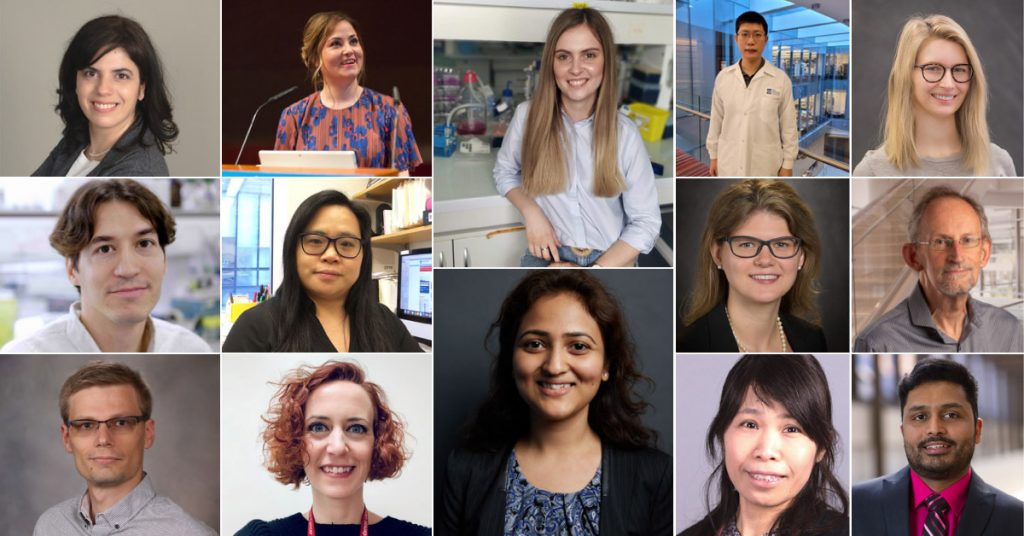Despite the challenges of fundraising during a global pandemic, your generous support allowed us to fund 16 top scientists at 14 esteemed medical centers across the globe. They will investigate important issues across the ovarian cancer landscape in this coming year.
These grants enable the brightest minds in cancer research to tackle long-standing issues like ovarian cancer drug resistance, and to break new ground toward immunotherapy, precision medicine, combination treatments, genetic mutations, and more.

“OCRA is so proud, and grateful, to fund this new and promising group of investigators, all of whom are working to answer some of the most critical questions in ovarian cancer research today.
Audra Moran, OCRA President & CEO
We are thrilled to support these groundbreaking projects, whose findings will further our understanding of this complicated disease, and bring us closer to a world where no one needs to fear an ovarian cancer diagnosis.”
Collaborative Research Development Grant Recipients
- Ivan Ahel, PhD, University of Oxford, “Exploiting PARP-modulating enzymes in ovarian cancer therapy”
- Martin Cannon, PhD, University of Arkansas for Medical Sciences, “Understanding and targeting myeloid populations in ovarian cancer”
Liz Tilberis Early Career Award Recipients
- Sandra Cascio, PhD, Magee-Womens Research Institute, “EGFL6 as a new regulator of myeloid cell expansion and function in HGSOC”
- Liya Ding, PhD, Dana-Farber Cancer Institute, “Targeting therapeutic resistance to PARP inhibition in ovarian cancer”
- Arun Kanakkanthara, PhD, Mayo Clinic, “Exploiting a metabolic dependency of PARPinhibitor-resistant ovarian cancer”
- Ichiko Kinjyo, MD, PhD, University of New Mexico HSC, “A Novel Mechanism for the Immunomodulatory Effects of PARP-inhibitor”
Ann and Sol Schreiber Mentored Investigator Award Recipients
- Ronja Anugwom, PhD, MD Anderson Cancer Center, “Determine resistance mechanisms to ATR inhibition in ovarian cancers”
- Benoît Bragantini, PhD, Mayo Clinic, “Probing homologous recombination DNA repair factors in chromatin by cryo-EM”
- Sridevi Challa, PhD, UT Southwestern Medical Center, “Role of Ribosomal Protein Mono(ADP-ribosyl)ation in Protein Quality Control”
- Sammy Ferri-Borgogno, PhD, MD Anderson Cancer Center, “Spatially-resolved cellular and transcriptome analyses of ovarian cancer”
- Anup Singh, PhD, La Jolla Institute for Immunology, “Studying the role of BRCA1 in regulating heterochromatin structure and function in ovarian cancer”
- Bojana Stefanovska, PhD, University of Minnesota – Twin Cities, “APOBEC3B and DNA Repair as Synthetic Lethal Combinations in CCOC”
- Anne M. van Harten, PhD, Thomas Jefferson University, “Targeted MDM2 degradation as a novel treatment for ovarian cancer”
- Melanie Weigert, PhD, The University of Chicago, “Genome-wide profiling of 5-hydroxymethylcytosine on cell-free DNA”
- Xueyang Yu, PhD, Massachusetts Institute of Technology, “Macrophage Control of the Microenvironment Drives HGSOC Progression”
- Wei Zhou, PhD, The Wistar Institute, “Targeting the mevalonate pathway in ARID1A-mutated ovarian cancer”
These grants were made possible only because of direct support from you, our dedicated community. We thank you for your commitment to research that will save lives, and look forward to sharing more information on these cutting-edge projects, and the discoveries they yield, in the weeks and months ahead.


